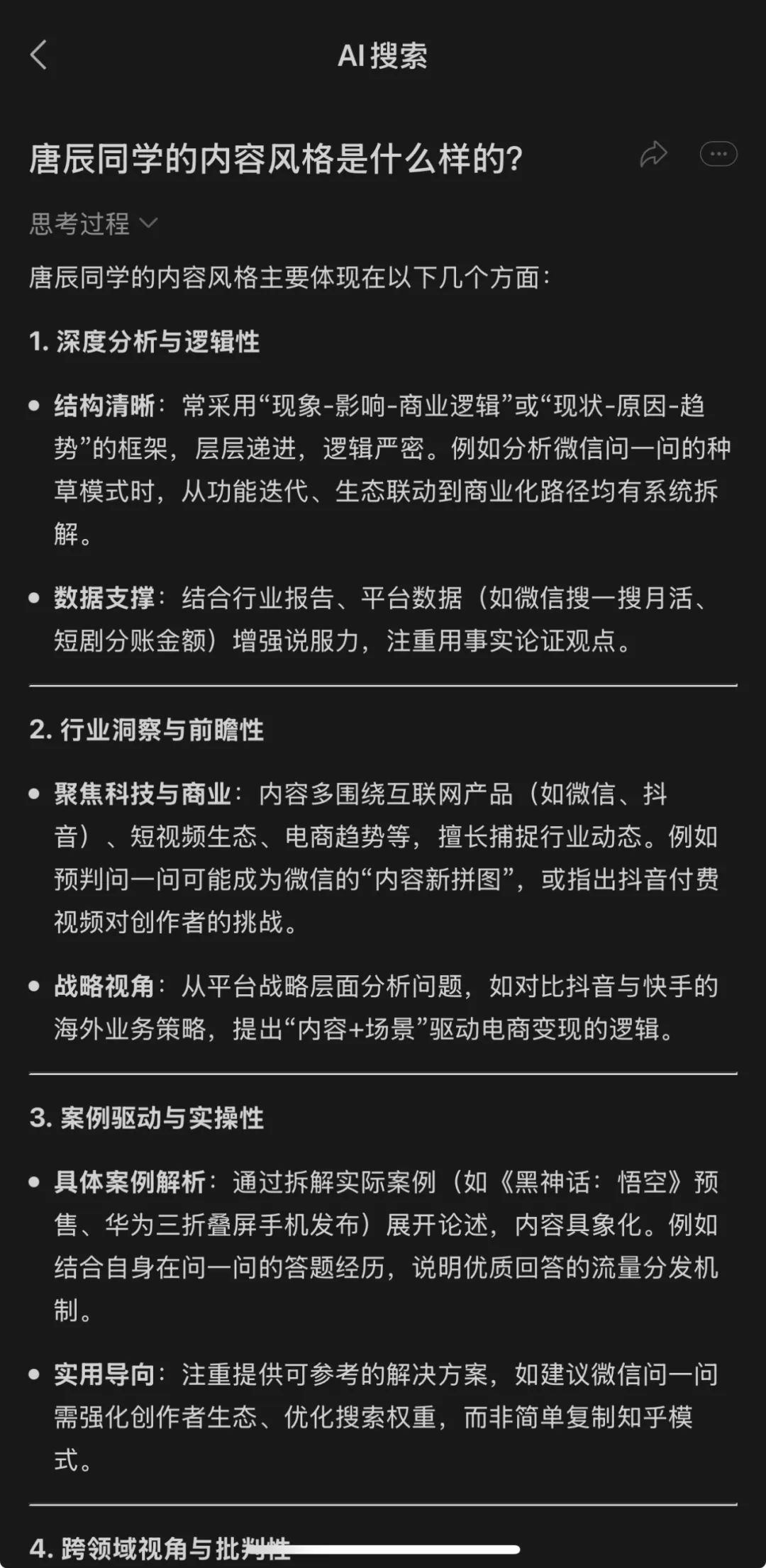Gray-Scale Testing of DeepSeek Integration: Is WeChat AI Search on the Horizon?
![]() 02/17 2025
02/17 2025
![]() 526
526
Why is WeChat Search integrating DeepSeek at this juncture?
On the evening of February 15th, Tang Chen observed while using WeChat Search that it was undergoing gray-scale testing for access to DeepSeek-R1. Certain WeChat users can tap on the search box to enter the "AI Search" page, where at the "Ask AI" entry, they can opt for either "Quick Answer" or "Deep Thinking".

'A Synergistic Combination'
According to the page description, the "Quick Q&A" mode furnishes the most frequently used, swift, and efficient responses. Essentially, "Quick Q&A" is the AI Q&A function introduced by WeChat in mid-2024: in addition to presenting conventional search results, WeChat Search also showcases AI-generated (AIGC) answers at the top of the results page.
The "Deep Thinking" mode, after extensive deliberation by the DeepSeek-R1 model, provides more exhaustive answers. During usage, this mode unveils the thinking and reasoning process, akin to the standalone DeepSeek App.
During a hands-on test, I inquired, "What is the content style of Tang Chen's posts?" The "Deep Thinking" mode detailed its reasoning process, conducting logical analysis of pertinent search results and extracting key information.

Ultimately, the "Deep Thinking" mode summarized in five domains: "In-depth Analysis and Logicality", "Industry Insight and Forward-thinking", "Case-driven and Practicality", "Cross-domain Perspective and Criticality", and "Language Style (Professional yet Vivid)", and distinctly listed typical content scenarios.
Moreover, "Deep Thinking" offered reading suggestions: Tang Chen's content is apt for readers intrigued by Internet industry trends and product operation strategies, particularly offering in-depth interpretations with both theoretical frameworks and practical references for practitioners.
The outcomes furnished by this "Deep Thinking" mode encompass information sources from both official account posts and webpage information, and at the footer of the page, it supports posing further queries. However, due to constraints in the corpus and training efficacy, there persist issues such as information silos, inability to retrieve historical answers, and inability to provide continuous responses.
WeChat's feature introduction page indicates that this product involves the provision and utilization of the DeepSeek open-source large model. The DeepSeek series of open-source large models are supplied by DeepSeek Inc., and we hereby acknowledge the contributions of DeepSeek Inc. and the DeepSeek open-source community to open-source large models and related research.
Currently, only a select group of users have access to the testing. This signifies that the "DeepSeek wave" has reached WeChat, and WeChat is leveraging this opportunity to further invest in AI within the search scenario, inching closer to its vision of establishing an intelligent knowledge hub for social scenarios, and its ambition for "AI Search" is crystallizing.
Regarding the partnership between "WeChat + DeepSeek", some netizens remarked, "National-level AI + national-level app, a genuinely synergistic combination".
Striving for "AI Search"
My primary concern is why WeChat Search is embracing DeepSeek at this time? There may be two primary reasons:
Firstly, it is influenced by the "DeepSeek Effect". As an advocate of the open-source approach, DeepSeek's success is deemed a triumph for open-source large models, and the value of open source has been significantly amplified. Since the Chinese New Year, major internet platforms, smartphone manufacturers, new energy vehicle companies, and large model vendors have successively integrated DeepSeek, aiming to gain an edge in this wave of open-source.
A notable example is Baidu, which announced on February 14th that it will successively roll out the ERNIE Bot 4.5 series over the coming months and officially open-source it from June 30th. It's noteworthy that Baidu previously emphasized "closed source" and was one of the most resolute opponents of "open source". One of the pivotal reasons for Li Yanhong's shift in attitude is the impact of DeepSeek.
Secondly, WeChat Search's embrace of DeepSeek is inherently rooted in the four words that appear after users open the search box: AI Search. In other words, WeChat's grander aspiration is to strive for AI search.

Previously, Yuanbao highlighted its AI search, integrating WeChat ecosystem content such as official accounts and video accounts, leveraging this as a competitive edge over other similar AI applications.
This time, WeChat Search's direct integration of DeepSeek is undoubtedly a nearby advantage, which will profoundly impact user experience, content ecology, and commercialization pathways within the WeChat ecosystem.
For instance, at the level of WeChat's content ecology, WeChat AI Search amalgamates official account articles, video accounts, mini-program services, Moments, webpages, and other content to achieve a one-stop search for "social + information + services". Especially for content creators, AI search will efficiently address the issue of "content sinking": the value of long-tail content such as historical official account articles and long and short videos on video accounts may be rediscovered through AI recommendations. This will further incentivize the production of in-depth and valuable content.
On this foundation, WeChat's user experience and commercialization pathways will also face a reimagining. The dispersed content information within the WeChat ecosystem (official accounts, video accounts, mini-programs, etc.) will be aggregated across scenarios through "conversational" intelligent interaction, transforming traditional search's reliance on keyword matching to present more precise and efficient results.
For example, if a user inquires about how to hail a ride at Beijing Capital Airport Terminal T3, my previously published "Quickest Guide to Taking Ride-hailing Vehicles at Beijing Capital Airport Terminal T3" on WeChat's Ask feature will directly appear on the search results page and may be linked to related official account articles or merchant stores.
Previously, Tang Chen analyzed in the article "WeChat to replicate a 'Zhihu' in the search box?" that WeChat is already a national-level super app with over 1.3 billion users, and diverse content carriers have "flourished" within it, such as official accounts, mini-programs, Moments, video accounts, Read, Listen, etc.
For an extended period in the past, the content pools within the WeChat ecosystem were largely fragmented and segregated, making it challenging for users to obtain pertinent information through a specific channel or pathway. Search naturally emerged as the key to unlocking WeChat's content trove, complementing recommendation by enabling people to discover information, connecting the entire WeChat ecosystem, and effectively disseminating information.
Regarding the positioning of WeChat Search, the WeChat team has stated that WeChat is not creating a purely independent search engine but rather serving as a component of the WeChat ecosystem to facilitate more precise connections between superior and more suitable content and services with users.
The search results it presents are grounded in content within the WeChat ecosystem, primarily encompassing three types: information, services, and brands.
The integration of products like DeepSeek into WeChat also signifies that large models have identified suitable application scenarios. WeChat can utilize AI to analyze user behavior and search content within the WeChat ecosystem, further personalizing recommendations, and even anticipating user needs before they search.
For instance, users can directly search for keywords such as "taxi" or "takeout" to navigate to mini-programs, without needing to exit WeChat, forming a closed loop of "search-service". A quintessential example of this was in October 2024 when WeChat officially announced the launch of the "Search Direct" feature for WeChat Search.
This transition from passive search to active recommendation also constitutes a shift in WeChat Search's approach to targeting "AI Search", constructing a more intelligent search service system.
However, for WeChat Search, both its strengths and challenges emanate from the closed nature of the WeChat ecosystem. Even as AI search emerges, issues confronted by the large model industry such as privacy protection, complex user experience due to over-reliance on AI, and large model hallucinations will also pose challenges for WeChat.
From this perspective, WeChat's deliberate pace is not entirely detrimental: being slower might also imply being more meticulous.








